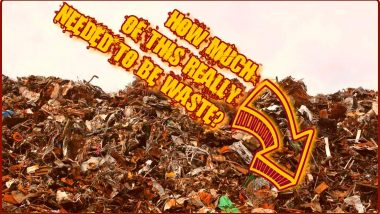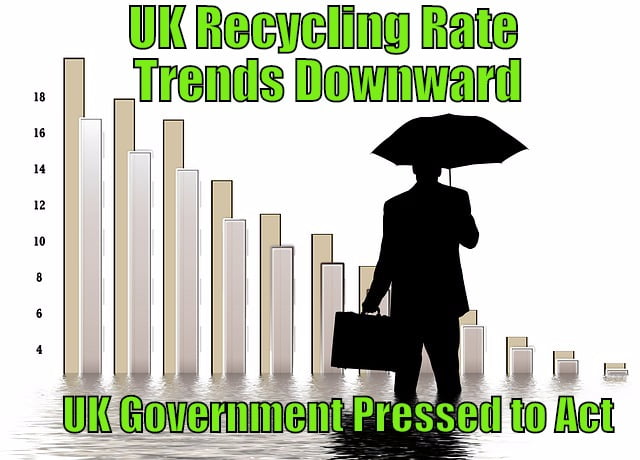 Stagnant or deteriorating UK Recycling Performance is a fact. The UK government claims that support for Brexit does not mean that the nation will turn its back on EU sustainability targets. But, where is the action which is needed to comply?
Stagnant or deteriorating UK Recycling Performance is a fact. The UK government claims that support for Brexit does not mean that the nation will turn its back on EU sustainability targets. But, where is the action which is needed to comply?
They suggest that the UK will continue to apply EU regulations for the protection of the environment.
But, this must be questionable after news this month of an at-best stagnant UK recycling performance.
(This article re-written in 2018 has been updated again. Scroll down for 2019 recycling performance update.)
This is all the more surprising because the government would seem to have forgotten their previous firm commitments, still officially in place, for recycling rates to be raised further. It is difficult to imagine how stringent new targets can now be achieved against this stark reality.
UK Recycling Performance 2000 to 2017
Professional Body CIWM Says UK's Recycling Performance is Slipping Backwards (December 2016)
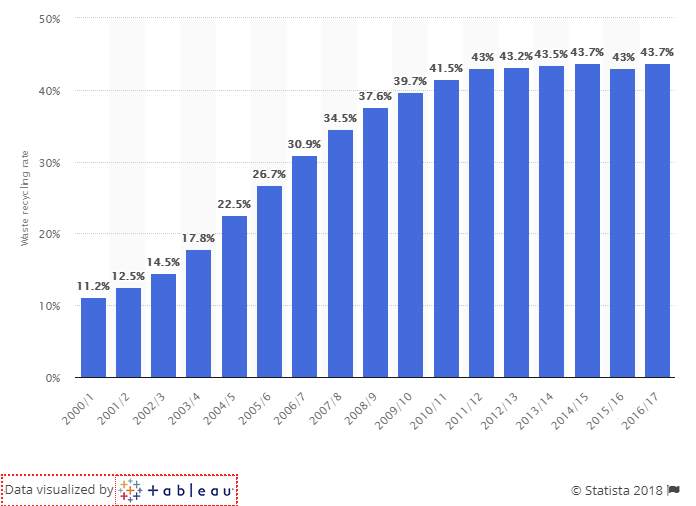
Graph Shows the household waste recycling rate in England from 2000 to 2017
After strong progress for more than a decade, it is disappointing to see the UK's recycling performance starting to slip backward. CIWM and other sector bodies have been predicting this for some time and Westminster must now sit up, take notice, and demonstrate its commitment to recycling.
Difficult market conditions have affected all UK countries, with local authority funding cuts also playing a part, particularly in England. Wales and Scotland have demonstrated that clear policies, targets, and focused efforts can maintain momentum and indeed provide long-term savings to councils. However, with England generating 83% of UK household waste they cannot do it alone. Firm endorsement of the WRAP consistency work would help, but we now need a strong push from the Westminster administration. via CIWM.co.uk/2016/latest-data
The problem started in England, and although there is probably some recycling fatigue among householders, much of the problem must rest with the cutbacks in new waste processing investment which started as soon as the 2010 coalition government took over from Labour in 2010.
Update February 2019:
UK Recycling Performance 2000 to 2018
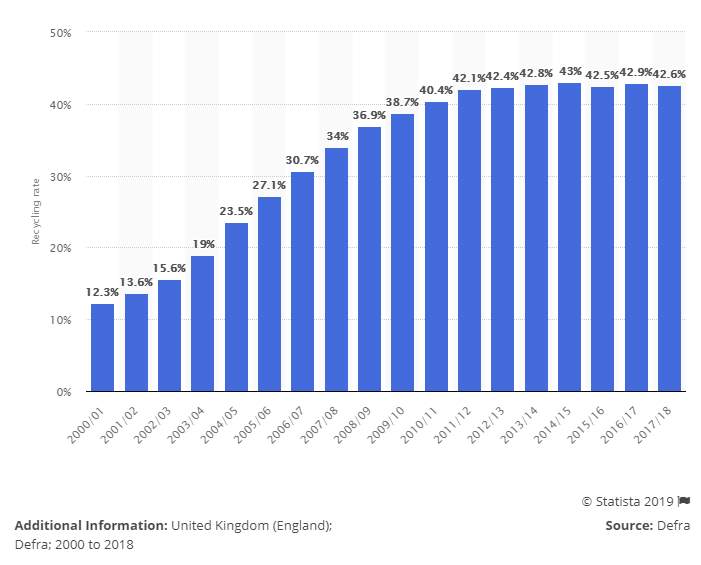 Graph Shows LA collected (household) waste recycling rate in England from 2000 to 2018
Graph Shows LA collected (household) waste recycling rate in England from 2000 to 2018
This updated graph (using slightly different data) shows the recycling rate of Local Authority collected waste in England from 2000 to 2018 (which we assume in this graphic includes LA collected commercial waste).
The recycling rate increased throughout the years shown, starting at 12.3 percent in 2000/2001 and more than doubled the rate achieved at the turn of the century, by 2005/2006.
A steady year-on-year increase was achieved by the 1997 to 2010 Labour government, with many PPI funded Waste Facility (MRFs/ Recycling Centres) Built schemes constructed.
But, the Coalition Government cut-backs meant that investment in new recycling facilities was cut-back. Thus, recycling rate increases slowed down after 2011/12.
The recycling rate dropped for the first time during this time period in 2015/2016. However, the rate increased from the 2015/16 low-point to a marginally better 42.6 percent in 2017/2018.
Falling Recycling Rates in England Since 2013/14 Admitted by UK Government
England's household annual recycling rates have fallen for the first time since modern records began with 2015-2016 England recycling rate falling to 43.9% vs. 44.7% in 2014/15 vs. 44.5% 2013/14, according to figures released this week by Defra.
However, the news was not all bad for high achieving councils. South Oxfordshire District Council maintained its title as England's best recycling council for the third year in a row. via
Gov.uk/packaging-consult.pdf
How the Situation Has Changed Since 2014 When WRAP Was Writing Glowing Reports on How Wonderful the UK Was at Recycling
To observers, it was always obvious that the big strides in recycling performance, which was being achieved in England pre-2014, were mostly due to long-term UK Public Private Investment (PPI) projects which had been started by the last labour government.
The coalition government, for the most part, scrapped the remaining PPI projects which had not been awarded, but failed to replace them with much at all. It was inevitable that as the last of the previous Labour Government's waste processing waste management facility investment initiatives came into use, recycling rates would fail to rise.
However, recycling capacity has not been reduced in the period, and waste tonnage disposed per person has not varied much (see the chart below), slightly decreasing between 2017 and 2018.
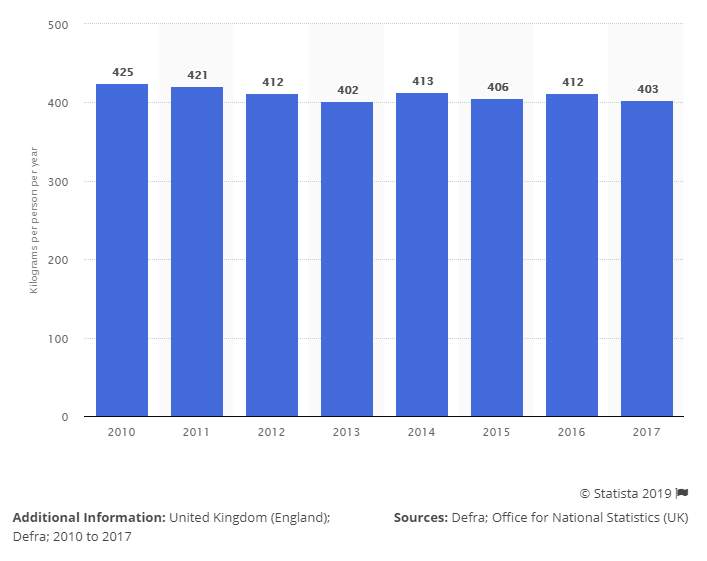
Total household waste volumes in England from 2010 to 2017 (in kilograms per person)
Therefore, the reversal must have its origins to other factors as well, such as an increasing reluctance in the population to mess around with separating their waste. This has been called “recycling fatigue”, but the reversal may also partly be due to the rising population of the UK due to immigration at a net influx of 200,000 to 300,000 annually in many years.
Public faith in recycling is being undermined by the UK Press as UK Recycling Performance suffers.
Sadly, in part, the problem may also partly arise from the right wing UK Press, and especially from unremittingly bad press publicity in the Daily Mail.
UK Recycling Performance 2000 to 2010 – UK Recycling Industry was a Success Story
The following extract is from what we said about a 2011 WRAP (UK government funded body) report [Defra link no longer available]. It seems to be really out-of-date now!:
“The UK recycling industry is a fantastic success story and year on year we have recovered and recycled more and more materials contributing to the Circular Economy whilst creating jobs and thus a multi-billion pound industry to support UK PLC.”

What we said in 2014 about constant “Daily Mail Negativity” about waste matters:
That achievement should have been celebrated. It wasn't, because the Conservative government continued to criticize the Labour Party for overspending, and the improvement was dismissed as “irresponsible spending” which the nation could not afford.
Wastersblog said at the time:
“If the Daily Mail were to report this in a positive light, they would have to admit that to a far better impact on our environment than their persistent negative reporting suggests.”
“Perhaps the Daily Mail should have reported the work being coordinated by WRAP and supported by cross-industry organisations to streamline municipal recycling collection systems as recommended by Recycling Minister Rory Stewart. Another example of how the industry is reacting and striving year on year to improve performance.”
“Sure, we can always improve and evolve, and paper cups are a case in point.”
“Yet the Daily Mail article fails to properly address the positive steps that are being taken.”
“The fact is that the James Cropper paper-making group have invested £5 million into the technology to recover and recycle paper coffee cups. We know that waste management companies in the UK are talking to the coffee cup producers to find solutions for their effective recovery.”
“They have made great strides in identifying a problem and finding a solution to it.”
via plastic-packaging-market-study-plastic-flow-2014
WRAP may have considered that they had a small problem in 2011, but it is much bigger now. UK Recycling Performance is flat at best and waste facility/ recycling investment is doing little more than replace existing capacity as equipment becomes worn-out.
To comply with stated UK government targets after Brexit, action will be urgently required.
We welcome your comments on this.
Attribution: Charts by Statistica.


